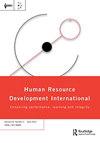Transformational leadership effectiveness: an evidence-based primer
IF 3.9
Q2 MANAGEMENT
引用次数: 6
Abstract
ABSTRACT The proliferation of leadership models can leave practitioners confused about which model to use in guiding their leadership development initiatives. Although ‘new’ leadership models (e.g. authentic, ethical, and servant leadership) suggest theoretical differences, empirical research has shown considerable overlap among these models and longer standing ones such as transformational leadership. With extant literature questioning the added empirical value of these newer models, this paper aims to distil the best evidence about transformational leadership into a ‘primer’ that can help practitioners use evidence-led practices in their leadership development. To do so, we briefly review major leadership models, highlight evidence for empirical redundancy between new leadership models and transformational leadership, and discuss meta-analytic findings between transformational leadership and outcomes of leadership. Our review suggests that these newer leadership models add little incremental validity beyond transformational leadership in predicting various leadership outcomes. Moreover, transformational leadership demonstrates medium to large effect sizes on a range of individual, team, and organisational outcomes. Taken together, our findings suggest that organisations can benefit by focusing their resources on transformational leadership development, rather than on the latest leadership fad.变革型领导的有效性:基于证据的入门
本文章由计算机程序翻译,如有差异,请以英文原文为准。
求助全文
约1分钟内获得全文
求助全文
来源期刊

HUMAN RESOURCE DEVELOPMENT INTERNATIONAL
MANAGEMENT-
CiteScore
11.40
自引率
11.10%
发文量
43
期刊介绍:
Human Resource Development International promotes all aspects of practice and research that explore issues of individual, group and organisational learning and performance. In adopting this perspective Human Resource Development International is committed to questioning the divide between practice and theory; between the practitioner and the academic; and between traditional and experimental methodological approaches. Human Resource Development International is committed to a wide understanding of ''organisation'' - one that extends through self-managed teams, voluntary work, or family businesses to global enterprises and bureaucracies. Human Resource Development International also commits itself to exploring the development of organisations and the life-long learning of people and their collectivity (organisation), their strategy and their policy, from all parts of the world. In this way Human Resource Development International will become a leading forum for debate and exploration of the interdisciplinary field of human resource development.
 求助内容:
求助内容: 应助结果提醒方式:
应助结果提醒方式:


